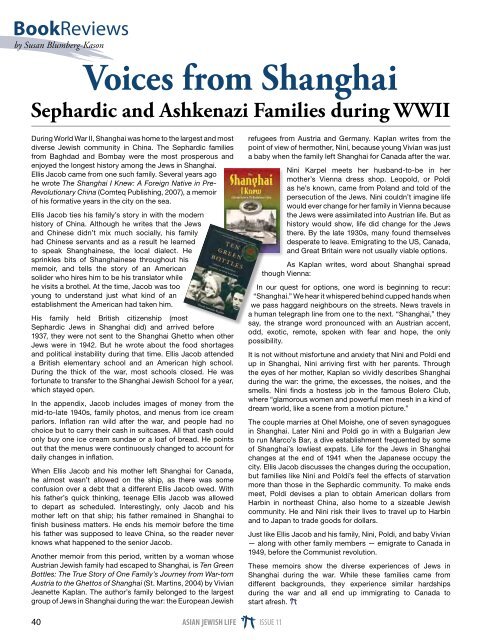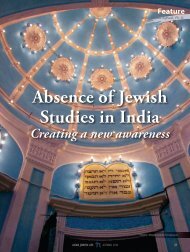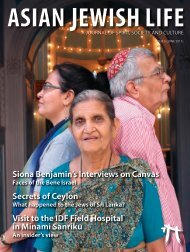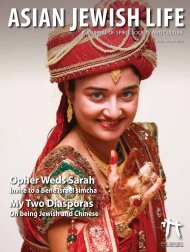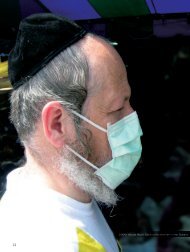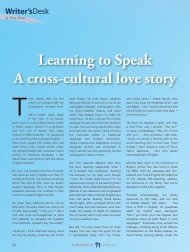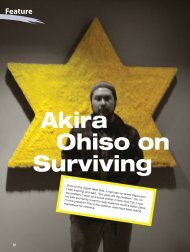AJL magazine - Asian Jewish Life
AJL magazine - Asian Jewish Life
AJL magazine - Asian Jewish Life
- No tags were found...
Create successful ePaper yourself
Turn your PDF publications into a flip-book with our unique Google optimized e-Paper software.
BookReviewsby Susan Blumberg-KasonVoices from ShanghaiSephardic and Ashkenazi Families during WWIIDuring World War II, Shanghai was home to the largest and mostdiverse <strong>Jewish</strong> community in China. The Sephardic familiesfrom Baghdad and Bombay were the most prosperous andenjoyed the longest history among the Jews in Shanghai.Ellis Jacob came from one such family. Several years agohe wrote The Shanghai I Knew: A Foreign Native in Pre-Revolutionary China (Comteq Publishing, 2007), a memoirof his formative years in the city on the sea.Ellis Jacob ties his family’s story in with the modernhistory of China. Although he writes that the Jewsand Chinese didn’t mix much socially, his familyhad Chinese servants and as a result he learnedto speak Shanghainese, the local dialect. Hesprinkles bits of Shanghainese throughout hismemoir, and tells the story of an Americansolider who hires him to be his translator whilehe visits a brothel. At the time, Jacob was tooyoung to understand just what kind of anestablishment the American had taken him.His family held British citizenship (mostSephardic Jews in Shanghai did) and arrived before1937, they were not sent to the Shanghai Ghetto when otherJews were in 1942. But he wrote about the food shortagesand political instability during that time. Ellis Jacob attendeda British elementary school and an American high school.During the thick of the war, most schools closed. He wasfortunate to transfer to the Shanghai <strong>Jewish</strong> School for a year,which stayed open.In the appendix, Jacob includes images of money from themid-to-late 1940s, family photos, and menus from ice creamparlors. Inflation ran wild after the war, and people had nochoice but to carry their cash in suitcases. All that cash couldonly buy one ice cream sundae or a loaf of bread. He pointsout that the menus were continuously changed to account fordaily changes in inflation.When Ellis Jacob and his mother left Shanghai for Canada,he almost wasn’t allowed on the ship, as there was someconfusion over a debt that a different Ellis Jacob owed. Withhis father’s quick thinking, teenage Ellis Jacob was allowedto depart as scheduled. Interestingly, only Jacob and hismother left on that ship; his father remained in Shanghai tofinish business matters. He ends his memoir before the timehis father was supposed to leave China, so the reader neverknows what happened to the senior Jacob.Another memoir from this period, written by a woman whoseAustrian <strong>Jewish</strong> family had escaped to Shanghai, is Ten GreenBottles: The True Story of One Family’s Journey from War-tornAustria to the Ghettos of Shanghai (St. Martins, 2004) by VivianJeanette Kaplan. The author’s family belonged to the largestgroup of Jews in Shanghai during the war: the European <strong>Jewish</strong>refugees from Austria and Germany. Kaplan writes from thepoint of view of hermother, Nini, because young Vivian was justa baby when the family left Shanghai for Canada after the war.Nini Karpel meets her husband-to-be in hermother’s Vienna dress shop. Leopold, or Poldias he’s known, came from Poland and told of thepersecution of the Jews. Nini couldn’t imagine lifewould ever change for her family in Vienna becausethe Jews were assimilated into Austrian life. But ashistory would show, life did change for the Jewsthere. By the late 1930s, many found themselvesdesperate to leave. Emigrating to the US, Canada,and Great Britain were not usually viable options.As Kaplan writes, word about Shanghai spreadthough Vienna:In our quest for options, one word is beginning to recur:“Shanghai.” We hear it whispered behind cupped hands whenwe pass haggard neighbours on the streets. News travels ina human telegraph line from one to the next. “Shanghai,” theysay, the strange word pronounced with an Austrian accent,odd, exotic, remote, spoken with fear and hope, the onlypossibility.It is not without misfortune and anxiety that Nini and Poldi endup in Shanghai, Nini arriving first with her parents. Throughthe eyes of her mother, Kaplan so vividly describes Shanghaiduring the war: the grime, the excesses, the noises, and thesmells. Nini finds a hostess job in the famous Bolero Club,where “glamorous women and powerful men mesh in a kind ofdream world, like a scene from a motion picture.”The couple marries at Ohel Moishe, one of seven synagoguesin Shanghai. Later Nini and Poldi go in with a Bulgarian Jewto run Marco’s Bar, a dive establishment frequented by someof Shanghai’s lowliest expats. <strong>Life</strong> for the Jews in Shanghaichanges at the end of 1941 when the Japanese occupy thecity. Ellis Jacob discusses the changes during the occupation,but families like Nini and Poldi’s feel the effects of starvationmore than those in the Sephardic community. To make endsmeet, Poldi devises a plan to obtain American dollars fromHarbin in northeast China, also home to a sizeable <strong>Jewish</strong>community. He and Nini risk their lives to travel up to Harbinand to Japan to trade goods for dollars.Just like Ellis Jacob and his family, Nini, Poldi, and baby Vivian— along with other family members — emigrate to Canada in1949, before the Communist revolution.These memoirs show the diverse experiences of Jews inShanghai during the war. While these families came fromdifferent backgrounds, they experience similar hardshipsduring the war and all end up immigrating to Canada tostart afresh.40 ASIAN JEWISH LIFE ISSUE 11


